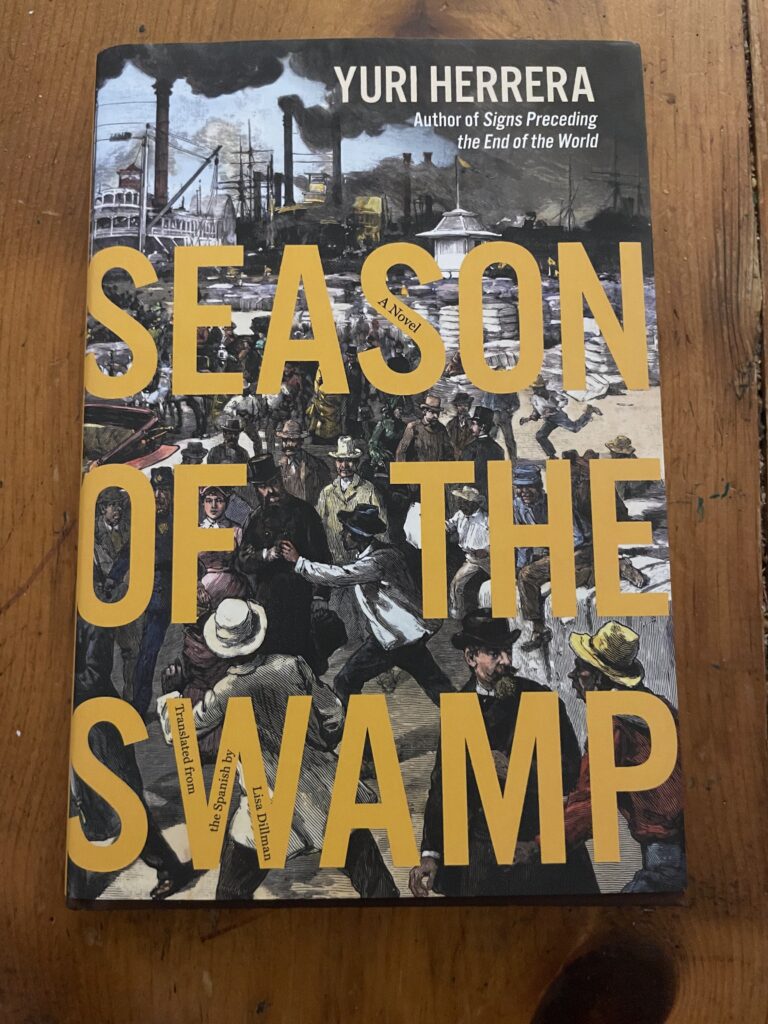“As soon as they left the river and entered the bayou, the landscape grew denser, twitchier, closer, as if the trees had bent over to give them a sniff.” – Yuri Herrera, ‘Season Of The Swamp’
For whatever reason—maybe because I felt like I was trying to reinvent myself like every five years from ages 13-35, maybe because I so enthusiastically ditched my hometown—I think about Jesus absolutely bombing in Nazareth a lot. Well, not the specifics, but the idea of “a prophet having no honor in their hometown.” Not to call myself a prophet. It’s more like, if someone from my past brings up, say, my lyric writing in my high school pop punk band in response to me saying that I write professionally. Even more broadly, I think often about how crucial it is to move, somewhere else, at some point. Even though my kid is getting raised in Paradise On Earth Chicago, I fully expect him to live elsewhere at least for a time. Hell, I think he does, too—he talks about moving to Baltimore a lot.
That said, I have never been exiled. The subject of this week’s book is an exile, and it made me think there might be a reverse to “a prophet has no honor in their hometown.”
What I’ve Been Reading This Week:
A book that is set in New Orleans—just an all-timer of a setting. Swampy, Romantic, musical, interested in interesting architecture—all of that, of course, masking the ugliness and brutality and suffering both the land and the people can often inflict. A book, despite all that, is about Mexico. A book that’s about politics and revolution, but those things keep getting interrupted by pedestrian issues like “we don’t have any money” and “we aren’t from here.” This is as disorienting as these initial paragraphs get, which I imagine mirrors the characters’ feelings, because I’m talking, of course, about Season Of The Swamp by Yuri Herrera.

Season Of The Swamp by Yuri Herrera: the basics of this wonderfully brief novel are this: future first Indigenous Head of State in the Americas, Benito Juárez, is about as far away from that dream as he can be. The recently restored Santa Anna government has exiled Benito and his main homies, and they’ve landed in New Orleans in the 1850s. So, you know. Importing slaves is illegal, but slavery is still the law of of the land, and jazz hasn’t been invented yet. No word if Benito had beignets, but it’s always possible I missed something. Point is, it’s not Mardi Gras ’04 With The Bros, but it still New Orleans—racially diverse, a mishmash of a few very strong cultural flavors, and hot as Hell in the summer.
There’s a lot in this novel, given its length. Each section its own sort of capsule, building to Juarez’s return to Mexico. It’s all imagined, I should say, so when I type “we see his politics developing,” that’s made up. I don’t typically go for these types of historical novels—scars from otherwise well-meaning, upper middlebrow Boomers reading antebellum historical fiction and imploring me to remember that “not every white person was bad, you know.” Perhaps I just needed one aligned with my politics (and set in New Orleans). But I think two things: the shortness and focus of this book does it a lot of favors, and the idea that an Indigenous leader could rise up out of any right wing morass is an inspiring story worth being rehearsed.
It also helps that Herrera is an incredible writer. I almost couldn’t finish the book, how much I was stopping to write down epigraphs in my phone’s notes app. The really strong part I wanted to focus on is when Benito and homies are in a slave market. Maybe the most concise way to put it is the unedited first notes I wrote, the moment I finished the novel: it is remarkable how clearly people from other countries can see the U.S. for what it is. This novel has an incredibly wrenching depiction of a slave market. I don’t want to get into details, but safe to say it’s an indictment of the evil hive mind white supremacy creates. It shows how, despite its hegemony, in some ways? The colonial empire of the Americas—the entrenched colonial white supremacy of the U.S. and Canada, and the more insidiously assimilated white supremacy (from Spain and Portugal on up to 19th- and 20th-century U.S.) of Central and South America—that order is frail. That order depends on a capitalist hive mind, this Hobbesian fiction that life is necessarily nasty, brutish, and short. Life should be exciting, beautiful, and dignified. Capitalism and empire depend on humans competing in a zero-sum game, and that order does not have to stand. Something new can built, on more equitable foundations, on more sustainable foundations.
LINKS!
Something to listen to while you browse? I recently got put on to Madlib’s solo work (of course I am a big MF DOOM fan), which led me to his jazz band, Yesterday’s New Quintet. I put on the Stevie album because 38 minutes seemed like a good amount of time to sample someone’s work while committing to a whole album—then, I realized that it was all Stevie Wonder covers. OH NO ALL STEVIE WONDER COVERS. Been a hit in Casa de Corlew, Mal even asked me to send her the link. So I found a YouTube video, and here you go:
- “There’s Music In The Land” by Lotte van der Krol in Kaleidotrope
- Month-old article, but I feel like it’ll be useful re-reading for a while: Inside the neighborhood patrols watching for ICE: ‘They thought they could scare us, but this is LA’ by Betsy Reed in The Guardian
- Great piece from Barry Petchesky in Defector about the snowmen in Calvin & Hobbes being a world all their own. A pulle quote, because Defector is subscription-based (but worth it!): “[The snowmen] gag wasn’t about heart, or so I didn’t think as a kid. It was about what a young boy finds funny, and what a young boy finds funny is cartoonish violence, and what a young boy finds strange is that everyone doesn’t find it as funny as he does.”
- Hey, some more ICE-fighting heroes: In the heart of the Miccosukee, the Native American tribe that shut down Alligator Alcatraz by Abel Fernández in El País.
- “Forever” by Spencer Lee in X-R-A-Y
What’re you still doing here? Don’t you know that Micah and Brendan have a show?
If you work in the service industry, may you clean up in tips this weekend. Look, weekend shifts are tough. You can do it, though. As Herrera says, “thieves, injuries, fatalities. But who remembered any of that when you could breathe again.” Far more poetic, far more of-the-people and less frat bro than Keanu Reeves’ Shane Falco in The Replacements saying “pain is temporary, chicks dig scars, and glory lasts forever,” but you know what? Carry whichever quote you need into the weekend.
Sorry you got an email,
Chris

